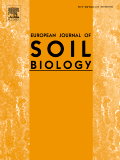
EUROPEAN JOURNAL OF SOIL BIOLOGY
Scope & Guideline
Pioneering Insights into Soil and Life
Introduction
Aims and Scopes
- Soil Microbial Ecology:
Research on the diversity, structure, and function of microbial communities in various soil types, their interactions with plants, and their role in nutrient cycling. - Soil Fauna and Ecosystem Functioning:
Studies examining the role of soil-dwelling organisms, particularly earthworms and arthropods, in soil health, nutrient dynamics, and ecosystem services. - Impact of Agricultural Practices:
Investigations into how different agricultural practices, including organic and conventional farming, affect soil biology, nutrient cycling, and soil health indicators. - Soil Amendments and Management:
Research on the effects of various soil amendments, such as biochar, compost, and organic fertilizers, on soil microbial communities and overall soil quality. - Soil-Biota Interactions:
Exploration of the interactions between soil organisms and their environment, including plant-soil interactions, effects of climate change, and management practices. - Soil Biogeochemistry:
Studies focusing on the chemical processes in soil that affect its biological properties, including nutrient cycling, carbon sequestration, and enzyme activities.
Trending and Emerging
- Soil Microbiome and Climate Change:
Research exploring the effects of climate change on soil microbial communities, including their resilience and adaptations, is gaining traction as the impacts of global warming become more pronounced. - Sustainable Agricultural Practices:
There is an increasing focus on studies that evaluate the effectiveness of sustainable agricultural practices, such as agroecology and conservation tillage, on soil health and biodiversity. - Soil Restoration and Rehabilitation:
Emerging research on techniques for restoring degraded soils and enhancing soil biodiversity, particularly in post-mining or disturbed lands, is becoming more prominent. - Microplastics in Soil Systems:
The impact of microplastics on soil ecosystems and their interactions with microbial communities is an emerging area of concern that has seen increased publication activity. - Functional Traits of Soil Biota:
Research emphasizing the functional traits of soil organisms and their ecological roles in nutrient cycling and soil health is gaining popularity, reflecting a shift towards understanding ecosystem functions.
Declining or Waning
- Traditional Soil Fertility Studies:
Research that primarily focuses on conventional soil fertility assessments without integrating biological aspects is becoming less prevalent, as there is a growing emphasis on understanding the biological factors that influence soil health. - Single-Organism Studies:
Investigations focused solely on individual soil organisms without considering their interactions within the broader soil ecosystem are less common, as holistic approaches gain traction. - Chemical Fertilizer Impact Studies:
Research specifically examining the impacts of chemical fertilizers on soil properties without considering biological responses is waning, as there is a shift towards sustainable practices that include organic amendments. - Invasive Species Impact Studies:
Although still important, studies specifically focused on the effects of invasive soil species are less frequent, possibly due to a broader focus on ecosystem resilience and management.
Similar Journals

BIOLOGY AND FERTILITY OF SOILS
Exploring the Vital Link Between Life and Soil HealthBIOLOGY AND FERTILITY OF SOILS, published by Springer, is a leading international journal dedicated to advancing the field of soil science with a focus on the intersection of biological processes and fertility management. With its ISSN 0178-2762 and E-ISSN 1432-0789, this journal serves as a key resource for researchers and professionals alike, reflecting its esteemed status in the community, evidenced by its Q1 rankings in Agronomy and Crop Science, Microbiology, and Soil Science. Covering a broad range of topics from soil health to sustainable agricultural practices, the journal's significant impact factor underscores its critical role in driving innovative research in the domain. While not offering Open Access options, it features rigorous peer-reviewed research that spans decades, converging influential studies from 1985 to 2024. Located in Germany with offices in the United States, the journal maintains a strong international presence, providing insights that enhance the understanding and management of soil ecosystems crucial for sustainable agriculture. Researchers aiming to expand their knowledge on soil biology and fertility will find this journal an invaluable asset.
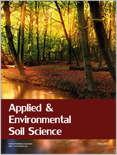
Applied and Environmental Soil Science
Pioneering research at the intersection of soil science and ecology.Applied and Environmental Soil Science, an esteemed journal published by HINDAWI LTD, focuses on disseminating high-quality research in the fields of soil science and environmental applications. With an ISSN of 1687-7667 and an E-ISSN of 1687-7675, this open-access journal has been a vital resource for the academic community since its inception in 2009. As of 2023, it holds a commendable position in the Q2 category for both Earth-Surface Processes and Soil Science, highlighting its impact in these crucial disciplines. The journal’s rankings further affirm its significance within the field, being placed 61st in Earth and Planetary Sciences and 58th in Agricultural and Biological Sciences. Researchers and practitioners alike benefit from the collaborative platform it offers for sharing innovative studies essential for sustainable soil management and environmental integrity. With a focus on advancing knowledge and fostering interdisciplinary dialogue, Applied and Environmental Soil Science stands as a crucial pillar for scholars and professionals dedicated to addressing the pressing challenges of soil and environmental health.

REVISTA BRASILEIRA DE CIENCIA DO SOLO
Empowering Research in Agronomy and Soil ManagementREVISTA BRASILEIRA DE CIENCIA DO SOLO, published by the SOC BRASILEIRA DE CIENCIA DO SOLO, serves as a vital open-access platform for disseminating impactful research in the fields of Agronomy and Soil Science. With an ISSN of 0100-0683 and an E-ISSN of 1806-9657, this journal has been fostering academic dialogue since 2003 and has gained recognition as a Q2 journal in both Agronomy and Soil Science as of 2023. Based in Brazil and actively supporting scientists and practitioners globally, it is uniquely positioned to address the challenges and innovations in soil management and cultivation practices. The journal's Scopus rankings reflect its commitment to quality, standing at #164/406 in Agronomy and Crop Science and #74/159 in Soil Science, placing it in the top quartile of its category. Researchers, professionals, and students are encouraged to contribute their findings and insights, making it a significant resource for anyone interested in advancing the science of soil and crop stewardship.

EGYPTIAN JOURNAL OF SOIL SCIENCE
Exploring the Depths of Soil Health and ProductivityEGYPTIAN JOURNAL OF SOIL SCIENCE is a renowned publication dedicated to advancing the field of soil science, particularly within the context of Egypt and the broader regions of the Middle East and North Africa. Published by the NATIONAL INFORMATION DOCUMENTATION CENTER, ACADEMIC SCIENTIFIC RESEARCH & TECHNOLOGY, this journal aims to disseminate high-quality research and innovative practices related to soil management, conservation, and sustainable agricultural practices. With an emphasis on empirical studies, reviews, and methodologies relevant to soil health and productivity, this journal serves as an essential resource for researchers, professionals, and students alike. Although specific access options are not highlighted, the journal’s commitment to promoting scholarly discourse ensures that important findings within soil science are made available to wider audiences, contributing significantly to environmental science, agronomy, and ecological preservation.
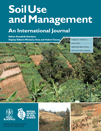
SOIL USE AND MANAGEMENT
Transforming soil science through rigorous research.SOIL USE AND MANAGEMENT is a premier academic journal published by Wiley, focusing on the critical domains of Agronomy, Crop Science, Pollution, and Soil Science. With an ISSN of 0266-0032 and an E-ISSN of 1475-2743, the journal has established itself as a vital resource in the field since its inception in 1985. Operating from its U.S. headquarters in Hoboken, NJ, SOIL USE AND MANAGEMENT boasts impressive Q1 rankings across its relevant categories, indicating its standing in the top tier of research journals. Notably, it is ranked 48th out of 406 journals in Agronomy and Crop Science and holds an 88th percentile position, as well as a commendable rank of 26th out of 159 journals in Soil Science, underscoring its influence and reach. This journal serves as an essential platform for researchers, professionals, and students dedicated to sustainable soil management practices and understanding soil's role in agricultural productivity and environmental health. Although it does not offer Open Access, its rigorous peer-review process ensures the publication of high-quality original research, reviews, and case studies critical for advancing knowledge and practice in the field. This journal is crucial for anyone engaged in soil science and its related disciplines, encouraging innovative approaches to challenges facing soil use and management today.

Frontiers in Soil Science
Exploring the vital role of soil in ecosystems.Frontiers in Soil Science, published by FRONTIERS MEDIA SA in Switzerland, is an esteemed open-access journal dedicated to advancing our understanding of soil systems and their vital role in ecosystem functioning and sustainable agricultural practices. Since its inception in 2021, this journal has quickly established itself within the scientific community, boasting a 2023 Scopus Q2 ranking in Soil Science and a notable percentile of 41 among its peers. Researchers and practitioners in the field will find a wide array of original research, reviews, and contributions that address key topics such as soil health, carbon sequestration, and nutrient cycling. With a commitment to fostering collaboration and dissemination of knowledge, Frontiers in Soil Science serves as a vital resource for professionals, researchers, and students who aspire to innovate and lead in soil science research.
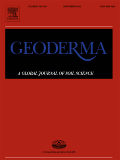
Geoderma
Transforming Soil Studies for Tomorrow's ChallengesGeoderma is a leading academic journal published by ELSEVIER, focused on the vital field of Soil Science. With an impressive impact factor and ranking as Q1 in its category for 2023, this journal stands as a prominent platform for researchers and professionals seeking to explore advanced scientific studies related to soil and its relationships with the ecosystem. Covering a wide range of topics from soil formation and characterization to land use and management practices, Geoderma is recognized for its rigorous peer-review process and is highly regarded within the global scientific community, as evidenced by its ranking of #12 out of 159 in the Scopus categories of Agricultural and Biological Sciences and Soil Science, placing it in the top 92nd percentile. With its inception dating back to 1967, the journal continually adapts and converges its content to meet the evolving demands of soil research until 2024 and beyond, providing invaluable insights for students, professionals, and researchers alike.

EURASIAN SOIL SCIENCE
Advancing soil science for a sustainable future.EURASIAN SOIL SCIENCE, published by PLEIADES PUBLISHING INC, is a premier journal dedicated to advancing knowledge in the fields of soil science and earth-surface processes. With an ISSN of 1064-2293 and an E-ISSN of 1556-195X, this journal has been a key resource for researchers and professionals from its inception in 1992 and continues to thrive as it converges toward 2024. Situated in the United States, EURASIAN SOIL SCIENCE has achieved notable recognition, attaining a Q2 ranking in both Earth-Surface Processes and Soil Science categories as of 2023. Its Scopus rankings further underscore its importance, with Earth and Planetary Sciences placing it at #81/179 and Agricultural and Biological Sciences ranking it at #80/159. Engaging a global audience, this journal publishes cutting-edge research articles, reviews, and case studies that address critical issues related to soil health, conservation, and management. Though currently not open access, the journal offers valuable insights and fosters collaboration among scientists and practitioners, underscoring its vital role in enhancing the understanding of soil dynamics and sustainability.

Soil Research
Transforming soil knowledge into actionable insights.Soil Research, published by CSIRO PUBLISHING, is an esteemed scholarly journal dedicated to advancing the field of soil science, environmental science, and earth-surface processes. With an ISSN of 1838-675X and E-ISSN of 1838-6768, this journal serves as a vital platform for researchers and professionals to disseminate innovative findings and engage with contemporary challenges in soil and environmental management. The journal is recognized for its impactful contributions, as evidenced by its Q2 ranking in 2023 across multiple categories including Earth-Surface Processes, Environmental Science, and Soil Science, reflecting its influence and relevance in these critical academic areas. Operating from its headquarters in Clayton, Victoria, Australia, Soil Research is committed to fostering open access to research, ensuring wider dissemination of knowledge. As it converges toward its future objectives until 2024, the journal aims to provide a forum for diverse perspectives that enhance understanding and stewardship of soil resources, making it an indispensable resource for students, researchers, and industry professionals alike.
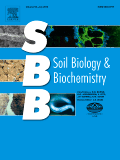
SOIL BIOLOGY & BIOCHEMISTRY
Pioneering Research in Soil and Microbial DynamicsSOIL BIOLOGY & BIOCHEMISTRY, published by Pergamon-Elsevier Science Ltd, is a premier academic journal that plays a pivotal role in advancing the fields of microbiology and soil science. Established in 1969, this esteemed journal has gained recognition for its rigorous publication standards and impactful research contributions, evidenced by its prestigious Q1 rankings in both Microbiology and Soil Science categories for 2023. With an impressive Scopus rank of #3 among 159 in Agricultural and Biological Sciences and #14 among 182 in Immunology and Microbiology, it boasts a notable 98th percentile in its field. The journal offers researchers, professionals, and students a vital platform for sharing innovative studies and insights about soil ecosystems and their biochemical processes, fostering greater understanding and collaboration within the scientific community. While Open Access options are currently not available, the journal remains a cornerstone for those seeking to deepen their knowledge and contribute significantly to soil biology and biochemistry.